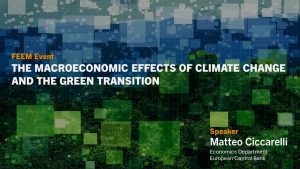The macroeconomic effects of climate change and the green transition
15.05.2024
15.05.2024
12:00 - 14:00
Prof. Matteo Ciccarelli, Economics Department, European Central Bank (ECB)
REGISTRATION
The event can only be attended in person
Registration is mandatory. To register, please click HERE
Event
Modelling interaction between climate change, the green transition and the macroeconomy requires empirically validated assumptions. The presentation will focus on a few questions of relevance from the perspective of central banks and on the importance to understand the business cycle effects of climate-related shocks and risks. Based on recent empirical and modelling work on the topic and through the lens of standard economic concepts and models, the presentation will shed light on the demand and supply channels of climate-related shocks, on the importance of appropriately choosing the variables and proxies to ‘identify’ the shocks and account for the transmission channels in empirical analyses, and on the asymmetric and heterogenous effects of weather shocks and climate policies across countries. The presentation will conclude with implications for modellers and policy makers.
Speaker
Matteo Ciccarelli is the Head of Forecasting and Policy Modelling Division in the Economics Department of the European Central Bank. He has a PhD in Quantitative Economics with a demonstrated history of research-based policy advice in central bank. His field of interest is Bayesian Econometrics applied to the international transmission of shocks, inflation and business cycles analysis, monetary policy, and forecasting. He has co-authored several articles published in the Review of Economics and Statistics, the Journal of Econometrics, the Journal of Monetary Economics, the Review of Economic Dynamics, and the Journal of International Economics, among others.

